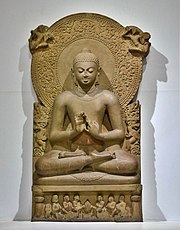| « Subha la studento: “Majstro Gotama, kio estas la kialo, kio estas la kaŭzo, ke ordinareco kaj eksterordinareco estas vidataj inter homoj, ene de la homa raso? Ĉar mallongvivantaj kaj longvivantaj personoj estas vidataj, malsanemaj kaj sanemaj, malbelaj kaj belaj, seninfluemaj kaj influemaj, malriĉaj kaj riĉaj, sube naskitaj kaj alte naskitaj, stultaj kaj discernemaj personoj estas vidataj. Do, kio estas la kialo, kio estas la kaŭzo, ke ordinareco kaj eksterordinareco estas vidataj inter homoj, ene de la homa raso?
Budho: Studento, estaĵoj estas posedantoj de kamma, heredantoj de kamma, naskitaj de kamma, rilatigitaj tra kamma, kaj havas kamma kiel siajn arbitracianton. Kamma estas tio, kio kreas malsamecojn inter estaĵoj en terminoj de bazeco kaj rafineco”...
Estas la kazo, studento, kie iu virino aŭ viro estas mortiganto de vivantaj estaĵoj, brutala, de sangkovritaj manoj, emanta mortigi kaj buĉi, montranta neniun kompaton por vivantaj estaĵoj. Tra la prenado kaj realigado de tiaj agoj, kun la rompiĝo de la korpo, poste de la morto, li aŭ ŝi reaperas en la tavolo de mizero, la malbona destino, la malsupraj regnoj, infero. Se, kun la rompiĝo de la korpo, poste de la morto — anstataŭ reaperi en la tavolo de mizero, la malbona destino, la malsupraj regnoj, infero — li aŭ ŝi venas al la homa stato, tiam li aŭ ŝi estas mallongvivanta tie, kie renaskiĝas. Ĉi tiu estas la vojo kondukanta al mallongdaŭra vivo: esti mortiganto de vivantaj estaĵoj, brutala, de sangkovritaj manoj, emanta mortigi kaj buĉi, montranta neniun kompaton por vivantaj estaĵoj.
Sed tiam estas la kazo, kie iu virino aŭ viro, forlasinte la mortigadon de vivantaj estaĵoj, abstinas disde mortigado de vivantaj estaĵoj, kaj loĝas kun vergo forĵetita, tranĉilo forĵetita, zorgema, kompatema, simpatianta por la bonstato de ĉiuj vivantaj estaĵoj. Tra la prenado kaj realigado de tiaj agoj, kun la rompiĝo de la korpo, poste de la morto, li aŭ ŝi reaperas en iu bona destino, en la ĉiela mondo. Se, kun la rompiĝo de la korpo, poste de la morto — anstataŭ reaperi en iu bona destino, en la ĉiela mondo — li aŭ ŝi venas al la homa stato, tiam li aŭ ŝi estas longvivanta kie ajn renaskiĝas. Ĉi tiu estas la vojo kondukanta al la longdaŭra vivo: esti forlasinta la mortigadon de vivantaj estaĵoj, abstini disde mortigado de vivantaj estaĵoj, loĝi kun vergo forĵetita, tranĉilo forĵetita, zorgema, kompatema kaj simpatianta por la bonstato de ĉiuj vivantaj estaĵoj. » | | « Master Gotama, what is the reason, what is the condition, why inferiority and superiority are met with among human beings, among mankind? For one meets with short-lived and long-lived people, sick and healthy people, ugly and beautiful people, insignificant and influential people, poor and rich people, low-born and high-born people, stupid and wise people. What is the reason, what is the condition, why superiority and inferiority are met with among human beings, among mankind?
Student, beings are owners of kammas, heirs of kammas, they have kammas as their progenitor, kammas as their kin, kammas as their homing-place. It is kammas that differentiate beings according to inferiority and superiority...
Here, student, some woman or man is a killer of living beings, murderous, bloody-handed, given to blows and violence, merciless to living beings. Due to having performed and completed such kammas, on the dissolution of the body, after death, he reappears in a state of deprivation, in an unhappy destination, in perdition, in hell. If, on the dissolution of the body, after death, instead of his reappearing in a state of deprivation, in an unhappy destination, in perdition, in hell, he comes to the human state, he is short-lived wherever he is reborn. This is the way that leads to short life, that is to say, to be a killer of living beings, murderous, bloody-handed, given to blows and violence, merciless to living beings.
But here some woman or man, having abandoned the killing of living beings, abstains from killing living beings, lays aside the rod and lays aside the knife, is considerate and merciful and dwells compassionate for the welfare of all living beings. Due to having performed and completed such kammas, on the dissolution of the body, after death, he reappears in a happy destination, in the heavenly world. If, on the dissolution of the body, after death, instead of his reappearing in a happy destination, in the heavenly world, he comes to the human state, he is long-lived wherever he is reborn. This is the way that leads to long life, that is to say, to have abandoned the killing of living beings, to abstain from killing living beings, to lay aside the rod and lay aside the knife, to be considerate and merciful, and to dwell compassionate for the welfare of all living beings. » |

